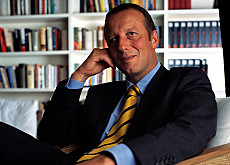Illuminating Switzerland’s political traditions

Ahead of the October parliamentary elections, Swiss consensus politics appears to be suffering, according to a new political and intellectual think-tank.
Swiss journalist Roger de Weck, one of the founding members of the Club Helvétique, talks to swissinfo about why liberal and social values need to be put back at the centre of political debate in Switzerland.
Club Helvétique, which takes its name from a collection of 18th-century Swiss revolutionary idealists, was set up by a group of intellectuals and politicians to look closer at what exactly makes the country tick.
Its declared aim is to “cultivate and stimulate political debate”, develop Swiss institutions and defend the country’s “liberal and social foundations”.
swissinfo: Your club is linked to the tumultuous period of the French Revolution. Is the situation so bad in Switzerland that things need to be turned upside down?
Roger de Weck: Our club’s main point of reference is 1848, the date when modern Switzerland was founded after the Age of Enlightenment, and not the French Revolution.
We feel there is a need for “enlightenment” in the current post-modern age, in which many commonly accepted ideas, such as the division of power or independent judiciary, are being called into question. We need to remind people about such values and show to what extent we are products of the Age of Enlightenment.
swissinfo: Club Helvétique urges politicians to be more responsible. Why’s that?
R. de W.: Politicians sometimes pay too much attention to the media or to consumerist attitudes. A populist approach typically invites citizens to consume politics.
The state then simply becomes a service provider, which should be cheap and whose main state function is to fight crime. In this sense we consume the state instead of contributing to it.
swissinfo: Club Helvétique is critical of hostility towards the state and current thinking that encourages widespread cutbacks. Here aren’t you directly targeting the rightwing Swiss People’s Party?
R. de W.: Of course we are criticising the Swiss People’s Party, but not them alone. But we are not avid supporters of a strong state system either – quite the opposite. There are numerous state reforms still to be made, but we cannot just deregulate and only worry about the Swiss economy.
We are also concerned about its vitality, but for Switzerland to become a modern nation it has to do more than just revamp its economy. It should also modernise its institutions and maintain political, economic and social equilibrium.
swissinfo: “Reaching consensus” is a phrase that frequently appears in Club Helvétique’s mission statement. Is the concept endangered?
R. de W.: It doesn’t really exist any more in government, which is based on proportionality, or balance of strength, rather than consensus-building. But proportionality has nothing to do with the desire for consensus, which involves collegiality and agreeing on programme guidelines.
Many democracies which don’t have this tradition of consensus haven’t been as successful as Switzerland.
swissinfo: Looked at from an economic point of view, isn’t globalisation a threat for the Swiss?
R. de W.: On the contrary, globalisation is a great opportunity for Switzerland. Its multicultural society offers a tremendous advantage, and allows it to have an intelligent, global strategy.
That being said, if you ignore Switzerland’s strengths and only focus on Anglo-Saxon models, which have nothing to do with Swiss reality, you weaken the country rather than strengthening it.
swissinfo: Club Helvétique claims to defend Switzerland’s “social foundations”. What are these exactly?
Over the past few decades the liberalisation of the economy has had a positive effect, as Switzerland was in the hands of a few cartels and had to be opened up.
But this shouldn’t be seen purely from an economic perspective. Switzerland should be thought of as a collection of cultural, political, social, ecological and economic values.
By creating this club what we are perhaps looking at is a new concept of patriotism that rejects political nationalism – the wrong response to economic internationalism.
swissinfo-interview: Carole Wälti
The Club Helvétique was originally a revolutionary club founded by people from Fribourg who moved to Paris in 1781 after the failure of an anti-government cantonal uprising.
Its members criticised the cantons’ aristocratic and conservative regime and tried to circulate their revolutionary ideas in Switzerland.
The new Club Helvétique, founded by Roger de Weck, takes the same name, but its point of reference is instead the Enlightenment and the creation of modern Switzerland in 1848.
The club is composed of 25 members – politicians and intellectuals from the four linguistic regions.
Notable members include Ticino senator Dick Marty, former Geneva senator Gilles Petitpierre, Zurich parliamentarian Barbara Häring-Binder, former federal judge Giusep Nay, journalist Joëlle Kunz, professor of sociology Kurt Imhof and historian Georg Kreis.
Roger de Weck was born in 1953 in canton Fribourg.
De Weck started his career as a journalist after studying economic and social sciences at St Gallen University.
He worked as the Paris correspondent for various Swiss newspapers before leaving to join the publishing industry. He then returned as editor-in-chief for the Zurich daily Tages-Anzeiger and German weekly paper Die Zeit.
He has also acted as an independent editorialist for several Swiss, French and German newspapers and regularly appears on television and radio.
De Weck is president of the foundation of the Graduate Institute of International Studies in Geneva. In 2004 he received the Davos tourism office media prize for his journalistic work.

In compliance with the JTI standards
More: SWI swissinfo.ch certified by the Journalism Trust Initiative
You can find an overview of ongoing debates with our journalists here . Please join us!
If you want to start a conversation about a topic raised in this article or want to report factual errors, email us at english@swissinfo.ch.